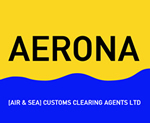Tel: 0161 652 3443 | Email: sales@aeronacca.co.uk
Aerona Customs Clearing Agents is proud to play a crucial role in ensuring the smooth transportation of dangerous goods across borders.
With the ever-evolving landscape of regulations, it is essential for the industry to adapt to changes that prioritise safety, efficiency and sustainability.
Here, we look at what these changes mean for the industry, and also recommend some proactive steps that companies and organisations can take to prepare for the changes.
Digital Documentation (e-DGD): Streamlining Processes
Outline:
The International Air Transport Association (IATA) is leading a significant shift towards electronic documentation (e-DGD) for dangerous goods shipments.
This transition is designed to revolutionise current practices by reducing paperwork, minimising errors and enhancing the traceability of dangerous goods.
Impact on the Industry:
1. Efficiency – Embracing digital documentation will streamline the entire documentation process, saving valuable time and resources previously spent on manual paperwork.
2. Error Reduction – Automated systems are inherently less prone to human error, ensuring the accuracy and reliability of documentation for dangerous goods shipments.
3. Traceability – The implementation of digital solutions will enhance tracking capabilities, facilitating improved traceability of dangerous goods throughout the shipping process for better monitoring and management.
Aerona Recommends:
1. Invest in Technology – To stay ahead, companies should invest in digital solutions and software that fully support the implementation of e-DGD.
2. Training – Proper training for staff on these new digital systems is crucial for a smooth transition and optimal utilisation of the technology.
3. Collaboration – Working closely with IT providers is essential to seamlessly integrate digital documentation systems into existing workflows, ensuring a harmonious transition.
Sustainable Packaging: Embracing Eco-Friendly Practices
Outline:
The International Air Transport Association (IATA) is rolling out guidelines and incentives to promote the use of sustainable and eco-friendly packaging materials for dangerous goods.
This initiative is a vital step in reducing the environmental impact of the airline cargo industry.
Impact on the Industry:
1. Environmental Responsibility – Embracing sustainable packaging materials will significantly reduce the carbon footprint associated with the shipment of dangerous goods.
2. Innovation – This shift towards sustainable packaging creates avenues for innovative packaging designs and materials, encouraging creativity within the industry.
3. Compliance – Companies that adopt sustainable practices will be well-positioned to meet and exceed future environmental regulations, showcasing their commitment to sustainability.
Aerona Recommends:
1. Source Eco-Friendly Materials – Identify and procure sustainable packaging materials that align with regulatory standards and environmental goals.
2. Redesign Packaging – Explore ways to revamp packaging processes to incorporate eco-friendly materials efficiently and effectively.
3. Stay Informed – Stay updated on the latest advancements in sustainable packaging technologies and best practices through continuous engagement with relevant entities such as TSA.
Enhanced Tracking: Leveraging Advanced Technologies
Outline:
The integration of cutting-edge tracking technologies such as RFID, GPS, and IoT is poised to transform the monitoring of dangerous goods during transit.
These technologies will offer real-time insights into the location and status of shipments.
Aerona Recommends:
1. Safety – Advanced tracking capabilities enhance the safety of dangerous goods by providing immediate information on their whereabouts and condition in transit.
2. Efficiency – Implementation of advanced tracking systems can optimise logistics operations, minimising delays and enhancing overall efficiency in the transportation process.
3. Compliance – The enhanced tracking functionalities will assist companies in meeting stringent regulatory requirements relating to the monitoring of dangerous goods shipments.
Preparation Tips:
1. Adopt Tracking Technologies – Invest in RFID, GPS, and IoT technologies to bolster tracking capabilities and ensure real-time monitoring of shipments.
2. Train Staff – Provide comprehensive training to equip staff with the necessary skills to effectively utilise the tracking technologies and interpret data accurately.
3. Monitor Performance – Implement a robust monitoring system to track the performance and efficacy of the tracking technologies employed, ensuring continuous improvement and compliance with industry standards.
Harmonisation with GHS: Ensuring Consistency Across Borders
Outline:
The International Civil Aviation Organization (ICAO) is aligning regulations with GHS for consistent classification and labelling of hazardous materials globally.
Impact on the Industry:
1. Simplified Compliance – GHS alignment streamlines international shipping with consistent standards.
2. Reduced Risk – Uniform labelling minimises miscommunication and mishandling risks.
3. Global Standards – Unified approach benefits companies in managing hazardous materials worldwide.
Aerona Recommends:
1. Update Systems – Ensure labelling systems conform to GHS standards.
2. Training – Educate staff on new GHS-aligned requirements.
3. Audit Compliance – Regularly assess adherence to GHS standards for ongoing compliance.
Advanced Training Modules: Focusing on Emerging Risks
Outline:
ICAO is developing specialised training modules addressing new and emerging risks associated with dangerous goods.
Impact on the Industry:
1. Enhanced Competency – Advanced training enhances personnel readiness for emerging risks.
2. Safety – Improved training elevates safety in dangerous goods handling.
3. Regulatory Compliance – Comprehensive training aids in meeting regulatory competency standards.
Aerona Recommends:
1. Invest in Training – Adopt advanced programs covering emerging risks.
2. Continuous Education – Promote ongoing education and skill development.
3. Monitor Effectiveness – Regularly assess training effectiveness for continuous improvement.
Risk-Based Approach: Adopting Flexible Safety Measures
Outline:
ICAO is shifting towards a risk-based approach for regulating dangerous goods, allowing tailored safety measures based on specific operational risks.
Impact on the Industry:
1. Targeted Safety Measures – Tailored safety measures enhance effectiveness and reduce incidents.
2. Flexibility – Companies can adopt personalised safety protocols aligned with their operations and risks.
3. Proactive Management – Embracing a risk-based approach encourages proactive risk handling, enhancing overall safety and compliance.
Aerona Recommends:
1. Conduct Risk Assessments – Regularly assess risks to identify and evaluate potential hazards.
2. Implement Tailored Measures – Introduce safety measures to address identified risks effectively.
3. Continuous Improvement – Monitor and enhance risk management practices continually to mitigate emerging threats proactively.
At Aerona, we see these changes to dangerous goods regulations (as outlined here) as more than merely administrative adjustments. They are strategic steps towards a safer, more efficient and sustainable future in the transportation of hazardous materials.
Aerona Customs Clearing Agents embraces these changes proactively to maintain our position at the forefront of the industry while upholding the highest standards of safety and compliance. Check out our complex cargo section
Incorporating sustainable packaging practices and adopting advanced tracking technologies will not only enhance safety and efficiency but also underscores Aerona Customs Clearing Agents’ commitment to environmental stewardship and technological advancement in the world of dangerous goods transportation.

